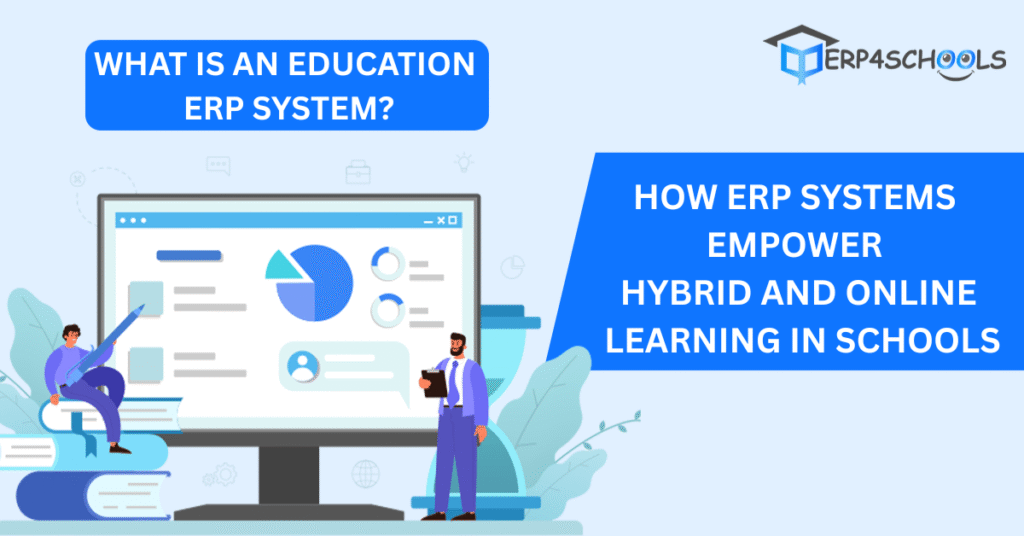What Is an Education ERP System and Why Schools in Lucknow Need It
An Education ERP (Enterprise Resource Planning) system is an integrated software solution designed to streamline and automate school management processes. Serving as a centralized platform, it connects departments such as admissions, finance, academics, HR, transport, and communication, ensuring smooth coordination and efficient information flow.
Traditionally, schools relied on manual paperwork or fragmented software tools for attendance, fee collection, report generation, and timetable scheduling. This often caused errors, delays, and lack of transparency. School ERP systems solve these problems by providing a cloud-based, real-time platform accessible to administrators, teachers, students, and parents.
Core Modules of an Education ERP
A modern School ERP in Lucknow typically includes the following modules:
- Student Information Management: Securely stores admissions, grades, attendance, and health records.
- Attendance Tracking: Monitors daily attendance, flags absences, and notifies parents automatically.
- Examination & Grading: Manages exams, tracks scores, generates report cards, and supports performance analytics.
- Online Admissions & Fee Management: Streamlines online applications, fee collection, invoicing, and finance reporting.
- Library & Inventory Management: Keeps track of books, uniforms, and other resources efficiently.
- Parent–Teacher Communication: Provides instant messaging, notifications, and portals for real-time engagement.
These modules reduce redundancy, save time, and enhance decision-making, making operations seamless and transparent.
The Changing Needs of School Management
Modern education demands instant access to information for parents, teachers, and administrators:
- Parents want real-time updates on attendance, grades, and school events.
- Teachers need streamlined access to lesson plans, assignments, and student performance.
- Administrators manage online admissions, digital fee collection, regulatory compliance, and data privacy standards.
The rise of hybrid and remote learning adds further complexity. Schools now handle online classrooms, mobile apps, digital assignments, and virtual parent-teacher interactions. Managing all of this manually leads to inefficiencies, errors, and communication gaps.
To meet these needs, best school ERP software in Lucknow offers centralized systems that handle academic, financial, administrative, and communication tasks while providing real-time collaboration and actionable insights.
Bridging Physical and Digital Classrooms with ERP
As hybrid learning grows, connecting physical classrooms with digital platforms is essential. A cloud ERP for schools in Lucknow acts as a central hub, integrating scheduling, attendance, learning materials, assessments, and communication tools in one unified system.
- For in-class learners: Automates attendance, manages resources, and tracks academic progress.
- For remote learners: Provides access to digital content, online classes, and assignments while syncing data across the system in real time.
Teachers can plan lessons, upload content, and evaluate students without switching between multiple tools. This bridges the gap between physical and digital learning, ensuring continuity, personalization, and flexibility while maintaining quality and control.
Enhancing Teacher Productivity and Student Engagement
Education ERP systems simplify teaching tasks, allowing teachers to focus on learning rather than administration.
With online School ERP in Lucknow, teachers can:
- Take attendance with one click
- Schedule classes and upload assignments
- Track student performance
- Generate report cards automatically
Students benefit from flexible access to lesson materials, homework, and feedback, increasing participation and engagement—even in hybrid or online settings.
Real-time communication tools improve interactions between teachers, students, and parents, making the learning experience more transparent and effective.
Key Features That Make ERP Essential for Schools
A robust ERP system combines multiple functions into a single, accessible platform:
- Centralized Student Data: Admissions, attendance, grades, and health records stored securely.
- Automated Attendance & Notifications: Biometric or app-based tracking keeps parents updated.
- Fee Management: Online payments, auto-generated invoices, reminders, and finance reports.
- Academic Management: Exam scheduling, grading, report cards, lesson plans, and performance analytics.
- Parent-Teacher Communication: Instant messaging, announcements, and mobile notifications.
- Additional Modules: Transport tracking, library management, payroll, timetable planning, and inventory control.
Cloud-based ERP ensures anytime, anywhere access, making it ideal for both in-person and hybrid learning environments.
Conclusion
In today’s dynamic educational landscape, Education ERP systems have become indispensable for managing hybrid and online learning environments.
By centralizing data, automating administrative processes, and streamlining communication, ERP solutions help schools:
- Operate more efficiently
- Track student progress in real time
- Personalize learning journeys
- Engage effectively with students and parents
A cloud-based ERP empowers schools to remain adaptable, connected, and future-ready, ensuring a seamless learning experience across both physical and digital classrooms.

